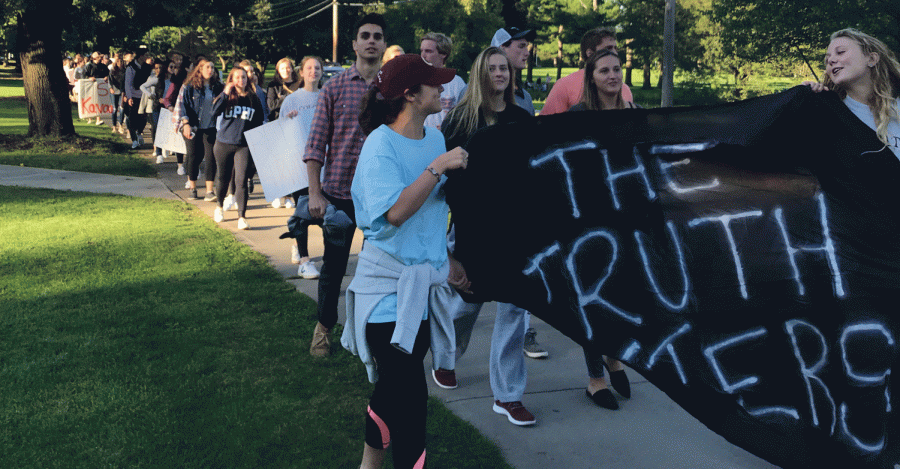Hundreds of Students and Faculty Participate in “Walk for The Truth”
Colgate community marches in response to allegations surrounding Brett Kavanaugh in a “Walk for the Truth” on Friday, September 28. The walk started at the Village Green and continued down Broad Street toward campus.
As the Kavanaugh trial has risen to the forefront of many American minds, Colgate community members marched from the Village Green down Broad Street carrying signs that read, “The Truth Matters,” “I Believe Her” and “Kava-nahh.”
The walk was organized and led by seniors Caroline Danehy and Sophie Grayer. It was open to every- one, regardless of political affiliation.
Grayer said it was important to march on the issues related to sexual assault and the question of political representation.
“Sometimes we forget that it doesn’t necessarily matter what political opinion you have, just that you need to listen to the people around you,” Grayer said. “That’s not me try- ing to be preachy. I just think that not only is our country really polarized, but sometimes this school is as well. I want to see times where everybody in this school comes together.”
Danehy expressed a similar sentiment about the impact of the march.
“Everyone has their own opinions and they’re all welcome because I think that’s actually how we can come to support one another. When people are on such polarizing sides, it’s hard to even have a dialogue. We just wanted to create a space where people can have that dialogue if they want, to show their support and march together,” Danehy said.
Danehy said that students can often remain isolated inside the “Colgate bubble,” forgetting that what happens outside of campus has an impact on their future.
“I think [walking] shows activism and that people actually care,” Danehy said. “Your opinion and your voice actually matter. Especially on Colgate’s campus, we wanted to bring it here because nobody was actually talk- ing about the issue and what was going on.”
Junior Eamon Reynolds agreed with these ideas.
“The main reason I went is because I am friends with women and I know women in my family who have dealt with sexual assault, and I know that when it’s not talked about people tend to not take it as seriously as it should be. I was glad to see so many students come out to march against sexual assault down Broad Street,” Reynolds said.
Director of ALANA Cultural Center LeAnna Rice said that diverse support networks for victims are important to have on college campuses.
“I think it’s important for the community to know that there are diverse perspectives represented here,” Rice said. “It helps improve our community because there are people moving to this community who need to be supported, and there are probably people al- ready in this community who have been victims themselves, so to see students, the University staff and other people showing that they care is so important.”
Danehy said that political activism can allow students to voice their opinions and set the tone they want to see within the community and their country.
“We’re supposed to be contributing to something bigger than ourselves and our own community,” Danehy said. “I think it’s important to open up your eyes a little bit and see what you can do in the world outside of yourself. While it’s more of an effort to do here, it matters just as much. The idea behind this march is not to be political or pick sides, but just express hope that the truth will come out.”
Dean of Students Maria del Carmen Flores-Mills was one of many faculty members who at- tended the march. She discussed why she felt personally compelled to march.
“I’m here for any survivors of sexual violence. I definitely want to show support and find ways to build community through communication,” Flores-Mills said.
Rice shared a similar explanation as to why she felt the need to march.
“I really wanted to be here to show support for the students. I wanted students to know there are faculty here to support them on campus. I think it just shows that we’re all still human,” Rice said.“My background is in counseling and therapy so I have supported a lot of victims, even supporting friends who have been affected. I think it’s important for students to see we’re people too and that we know that it’s hard.”
The march concluded outside of Donovan’s Pub where Danehy and Grayer thanked students and faculty for participating. A station was provided by the Colgate Vote Project to allow participants to register to vote if they had not yet done so.
“Sometimes I think that these men shouldn’t be dictating how the rest of our lives are going to go.” Grayer said. “I think sometimes when we’re in col- lege we can forget that the world out- side still exists, and we can’t really afford to do that anymore. So I think events like this, making sure people are voting and getting out there are the only things that people can do.”
Not being directly involved in the Colgate Vote Project, Grayer had previously avoided involving her political views into her personal life on campus.
“I’m super into politics personally,” Grayer said. “So I’m always aware but I’ve always been a little nervous to integrate my social life at Colgate with politics, which is why Caroline and I wanted to do this, to take the partisanship out of the conversation and know that sexual assault is an issue that everyone can stand for. Whether or not [Kavanaugh] is judged on his character, we should at least have some agency of what’s happening and have some voice.”
At the time of this writing, there was no set date for Kavanaugh’s confirmation vote on the full Senate floor.
Contact Alexandra Weimer at [email protected].







